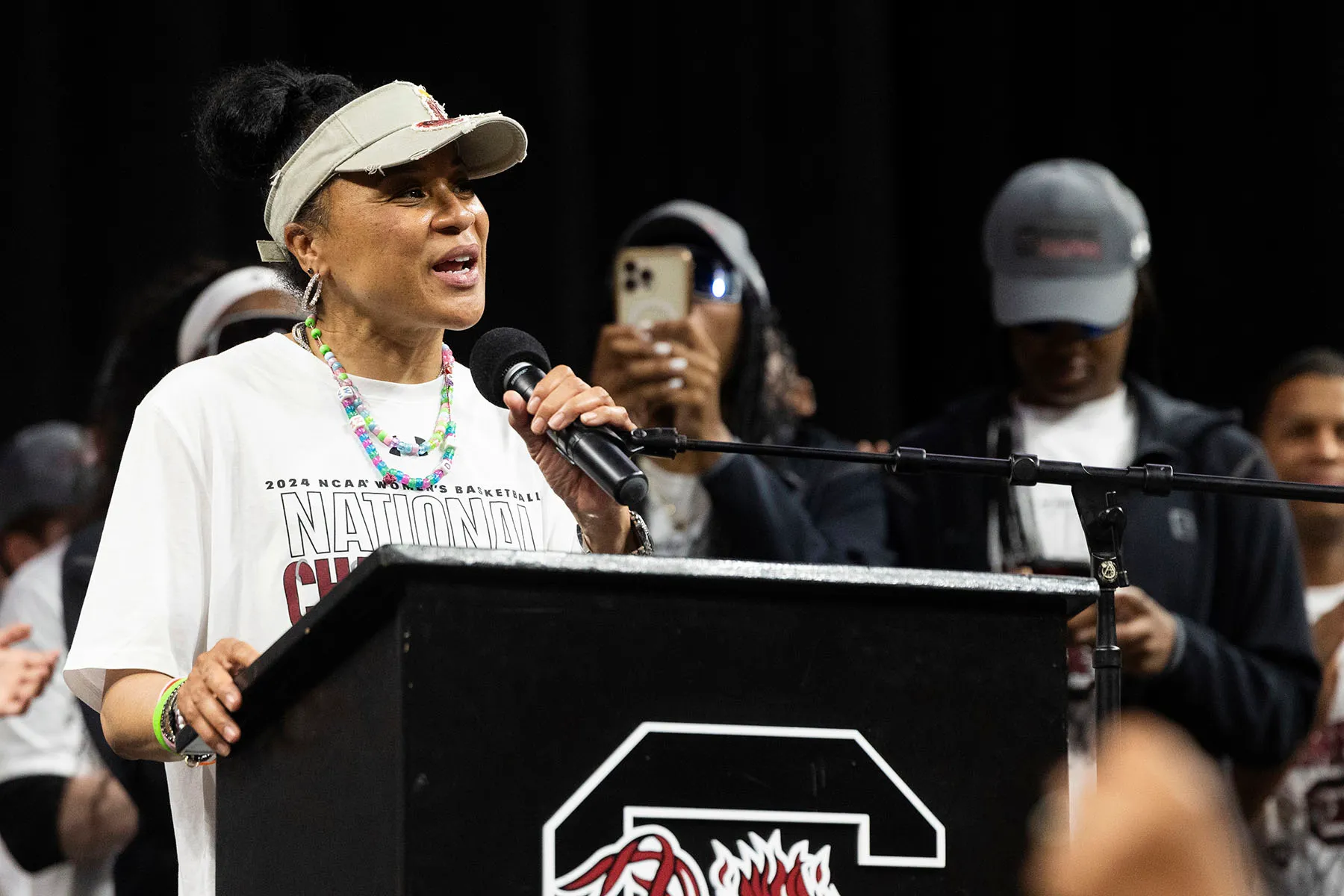South Carolina women’s basketball head coach Dawn Staley has long been known as one of the most respected voices in collegiate sports — and this week, she reminded the world exactly why. During a recent press conference, a reporter asked her a question that many public figures have tiptoed around: her stance on transgender women participating in women’s sports. Staley didn’t flinch. Her answer, brief but firm, instantly went viral.
“Trans women are women,” Staley said. “My opinion is everybody should be allowed to play. Simple as that.”
In an era when the intersection of sports, gender identity, and politics has become one of the most hotly debated issues in America, Staley’s clarity and decisiveness resonated far beyond the hardwood. Her comments sparked a wave of responses online, earning praise from advocacy groups, athletes, and fans across the globe. But they also reignited a contentious and emotionally charged conversation about fairness, inclusion, and the future of competitive athletics.
The moment came after the Gamecocks had just secured another NCAA Final Four appearance — their fourth in five years under Staley — a testament to her dominance as a coach. The press conference was supposed to be about the team’s success and the program’s ongoing excellence. Instead, it became a flashpoint in the national debate on transgender participation in sports.
For Staley, though, the issue wasn’t complicated.
“I know what the laws are. I know what the NCAA rules are. And I support those,” she continued. “If a trans woman wants to play and meets the criteria, I’m for it.”
Her response wasn’t just a statement — it was a line in the sand. At a time when more than 20 U.S. states have passed legislation restricting transgender athletes from competing in sports aligned with their gender identity, Staley’s unequivocal support carried significant weight. In a climate where even acknowledging the humanity of trans athletes can come with professional consequences, the Hall of Fame coach didn’t hesitate.
Social media platforms lit up within minutes of her remarks. LGBTQ+ advocacy groups like the Human Rights Campaign and GLAAD praised her courage and leadership. “Dawn Staley is a beacon of truth and compassion in the sports world,” one tweet read. “We need more leaders like her willing to stand up for inclusion.”
Former players, fellow coaches, WNBA stars, and celebrities echoed that sentiment. For many, it wasn’t just what she said — it was how effortlessly and confidently she said it. No hedging. No dodging. No caveats.
Yet, predictably, the backlash followed just as quickly. Critics accused her of undermining the integrity of women’s sports. Others called her “naïve” or “politically motivated.” Conservative commentators used the moment to reignite talking points about the perceived dangers of allowing transgender women to compete against cisgender women. Some even suggested that Staley’s comments were a betrayal of Title IX, the landmark federal law designed to protect women’s rights in educational programs and athletics.
But those who know Staley weren’t surprised by her willingness to speak up.
“She’s always been unapologetically herself,” said one of her former players. “Coach Staley has never shied away from using her platform for what she believes in. That’s what makes her not just a great coach, but a great leader.”
Indeed, Staley’s resume speaks for itself. A two-time Naismith Coach of the Year, Olympic gold medalist, and trailblazing figure in both the WNBA and college basketball, she’s built South Carolina into a juggernaut while earning admiration for her activism on issues ranging from racial justice to gender equity.
In 2020, amid nationwide protests following the killing of George Floyd, Staley penned an open letter demanding racial justice and accountability in sports. In 2021, she became the first Black woman to win two NCAA championships as a head coach. And in every interview, on every stage, she’s remained grounded in a philosophy that centers fairness, empathy, and inclusion.
Her comments on transgender athletes align with that legacy.
“This isn’t about politics for me,” she told reporters in a follow-up interview. “It’s about people. Human beings. Young people who just want to play the game they love. If we can’t support that, what are we even doing this for?”
Staley’s remarks arrive at a time when transgender athletes are facing increased scrutiny and hostility. From high school competitions to Olympic qualifiers, governing bodies are grappling with how to establish policies that balance inclusion with competitive equity. The NCAA currently allows transgender women to compete in women’s sports under specific guidelines, including hormone suppression for a designated period. Yet, critics argue these measures don’t go far enough to ensure fairness.
Supporters, meanwhile, point to the small number of transgender athletes participating and the lack of widespread dominance or disruption. They argue that the backlash is rooted more in fear and misunderstanding than in objective concern for sports integrity.
“There’s this idea being pushed that trans women are taking over women’s sports, and that’s just not supported by the data,” said Dr. Katrina Karkazis, a bioethicist who studies gender and sports. “What’s really happening is a moral panic, and unfortunately, trans athletes — particularly trans girls — are being caught in the middle.”
For Staley, the bottom line is straightforward: If someone loves the game, and the rules say they can play, they should be allowed to play.
“I want women’s sports to be respected, supported, and taken seriously. That includes all women,” she said.
Still, her position has thrust her into a national firestorm — something she appears prepared to weather. Staley has never sought to be a political figure, but she understands the power of her platform and the responsibility that comes with it. In a sport that has historically marginalized queer and trans athletes, her voice matters. And she’s choosing to use it.
When asked whether she feared backlash or professional consequences, her answer was calm and resolute.



